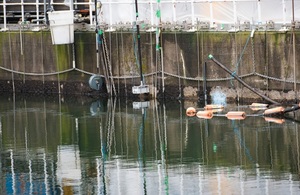Charities supporting disadvantaged women and girls through the coronavirus pandemic and recovery are to receive £15 million from the latest round of the Tampon Tax Fund.
Projects that help victims of domestic abuse, work with eating disorder sufferers, and provide mentoring for disadvantaged young women, are among those to receive grants of more than £1 million each over the next two years.
The money will also be used to make grants to smaller organisations so they can deploy services that support vulnerable women and girls.
Minister for Civil Society, Baroness Barran, said:
Vulnerable women and girls need our support more than ever in this difficult year, and these grants will help keep vital services going.
From supporting victims of domestic abuse, to those suffering from mental health problems, this funding will help to directly tackle some of the most serious issues facing women and girls today.
This year’s recipients can also use part of their grant funding to improve the sustainability of their organisations, helping them continue their vital work into the future.
The deadline for applications was extended this year in light of the coronavirus outbreak, to ensure as many front line charities as possible were able to apply.
The 12 projects receiving funding from this round of the Tampon Tax are:
Women in Prison (£1,000,000): The Creating Community Connections Project links women in prison with a network of local women’s centres, to offer holistic support to meet their needs, address root causes of offending, improve outcomes on release and intercept cycles of trauma, disadvantage and abuse.
Ovarian Cancer Action (£1,259,788): The funding will go towards a project to spearhead equal access to clinical excellence for all women with ovarian cancer regardless of where they live, their age or ethnicity.
Solace Women’s Aid (£1,614,288): The Labyrinth Project will help ensure all women have access to the support they need in the spaces most appropriate for them, joining up expertise across legal, economic, social and community spheres.
Rosa Fund (£1,906,855): Funding will benefit 27,000 women and girls through onward grants to 140 organisations of all sizes, helping them to navigate the pressures of the pandemic.
SafeLives (£1,488,534): The Your Best Friend project will empower 10,000+ young women with knowledge and confidence to act before someone harms or is harmed, to keep themselves and others safe.
Comic Relief (£1,282,173): Funding will be used for onward grants of between £40,000 and £250,000 to organisations led by BAME women for BAME women, to address violence against women and girls in England.
The Medaille Trust (£1,000,714): The Moving On Project focuses on meeting the long-term needs of women affected by trafficking and modern slavery.
Standing Together Against Domestic Abuse (£1,203,610): Funding the national roll out of Specialist Domestic Abuse Courts to improve the criminal justice response to domestic violence.
London Youth (£1,000,000): The programme will support BAME girls aged 10-14 and a cohort of 30+ youth workers, funding activities to promote mental health and wellbeing.
YMCA England and Wales (£1,000,861.00): Y’s Girls Mentoring will identify young people at risk of developing mild to moderate mental health issues and match them with a trained community-based volunteer mentor.
Beat (£1,074,032): The Keystone project aims to provide better health outcomes for girls and young women suffering from eating disorders through support for their carers.
Rape Crisis Scotland (£1,019,144.00): The Access to Change project aims to build the capacity of Rape Crisis services across Scotland to meet the needs of survivors of all forms of sexual violence, especially those who face additional barriers to support.
The Tampon Tax Fund uses the funds generated from the VAT on women’s sanitary products.
While the UK was a member of the European Union, VAT on these products could not fall below 5 per cent. The Chancellor announced in March this year that the tax will end in January 2021, at the end of the transition period following the UK’s exit from the EU.
Today’s announcement builds on the Government’s unprecedented £750 million package of support which is ensuring that tens of thousands of frontline charities can meet increased demand as a result of the coronavirus pandemic, and continue their vital work supporting those in need. This funding includes:
- The £200 million Coronavirus Community Support Fund for small and medium-sized charities working on the front line across England.
- £360 million via government departments, including £200 million to hospices across England, and £79 million to charities that support vulnerable children and people who have suffered from domestic abuse, sexual abuse and modern slavery;
- £37 million to the BBC’s Big Night In appeal, which has matched the generosity of the public in raising funds for Children In Need, Comic Relief and the National Emergencies Trust;
- £85 million through DCMS’ Community Match Challenge, which has doubled the money raised by recipients including Greggs Foundation, the Steve Morgan Foundation, Comic Relief and Global Radio’s ‘Make Some Noise’ campaign to unlock more than £160 million for good causes;
- £60 million to the Devolved Administrations to support charities in Scotland, Wales and Northern Ireland;
- £5 million to the Voluntary and Community Sector Emergencies Partnership to support volunteers in local areas.
It comes on top of the £150 million released from dormant accounts to help social enterprises get affordable credit to people who are financially vulnerable and support charities tackling youth unemployment.
With the wider Government financial support schemes in place, charities will continue to benefit from an unprecedented multi-billion-pound package of support.
ENDS
Notes to Editors
Additional quotes:
Denise Hatton, Chief Executive of YMCA England & Wales, said:
We are hugely grateful to have been selected as one of the recipients of the Tampon Tax Fund, the vital means from which will enable us to deliver our Y’s Girls mentoring programme.
We know that mental health issues among this age range are rising dramatically, and on top of that consistent and damaging cuts to youth services have left many young people isolated and without essential support.
Funding from the Tampon Tax Fund provides a much-needed bridge within our youth work, helping to reach young women and girls in their time of need.
Andrew Radford, Chief Executive of Beat, said:
We are extremely grateful for this new funding, which will help to support girls and young women suffering from eating disorders through training and support for families and carers.
We hope that our new work, made possible through the Tampon Tax Fund, will help to transform lives and allow as many people as possible to make full and sustained recoveries.
Cary Wakefield, Chief Executive Officer of Ovarian Cancer Action, said:
We are hugely grateful to be one of this amazing group of women’s charities to receive a grant from the Tampon Tax Fund.
The funding will enable us to address the very real health inequalities that exist and ensure all women with ovarian cancer receive the best standard of care, regardless of their age, ethnicity or location. This could significantly improve survival rates in the UK and we can’t wait to get started.
Rebecca Gill, Executive Director of Rosa, said:
Rosa UK and Smallwood Trust are delighted to have received money from the Tampon Tax fund. We are looking forward to distributing this funding to where it is most needed, enabling women’s organisations across the UK to support women and girls to overcome the complex and long-lasting challenges brought about by the Covid-19 pandemic. We know women’s organisations are in desperate need of funding to enable them to do this vital work.
Gerry Smith, Chief Executive Officer of the Medaille Trust, said:
We are so grateful to the Tampon Tax Fund for this phenomenal level of support. The £1million award will enable us and our partner, The Snowdrop Project, to deliver long-term support to vulnerable women affected by human trafficking and modern slavery.
The Moving On Project will give women the vital support they need to move forward with their lives, while reducing their vulnerability to abuse, violence and exploitation in the future.
Kate Paradine, Chief Executive of Women in Prison, said:
This funding will help hundreds of women in prisons across the country to connect with vital support services in their communities, including the network of specialist women’s centres.
Fiona Dwyer, Chief Executive Officer of Solace Women’s Aid, said:
This important fund will help us to create lasting change to the lives of the most marginalised women across three nations and the women’s groups and organisations that support them.
Only The Tampon Tax fund could meet the scale of our ambitions and we thank the Department for Digital, Culture, Media and Sport for their insight and confidence in enabling Solace and our incredible partners to create lasting change to the lives of over 20,000 women across three nations.
Pauline Daniyan, Director of Programmes at London Youth, said:
Young people today face a daunting reality. The pandemic could not have come at a worse time for them – just as they grow and develop their potential.
It is a tremendous opportunity to support youth clubs to be mental health hubs and extend this vital support for young women outside of schools and into the youth centres that make them feel welcome, supported and safe.
Suzanne Jacob, Chief Executive Officer of SafeLives, said:
Young women who are worried about their relationships turn to their friends and online, not to traditional services. Your Best Friend is a future-facing project from a creative partnership of charities and digital experts.
Working hand in hand, we’ll empower girls and young women to place the advice and reassurance they urgently need where young women already are – keeping them and their friends safe.
Ruth Davison, Chief Executive Officer of Comic Relief, said:
The alarming rise in domestic violence throughout the pandemic means that vital services are needed now more than ever.
With the generous support from the Tampon Tax we will work with frontline Black, Asian and minority led organisations that help women at risk of violence and abuse across England, especially those who find it harder to access mainstream services.
Sandie Barton, Director of Operations at Rape Crisis Scotland, said:
Seeking support after sexual violence is never an easy thing to do which is why it is so important that when someone is able to take that step, Rape Crisis Centres are resourced and able to be there at the point of need.
This welcome funding will make a real difference to survivors in Scotland not just by increasing capacity at a local level, but in carving paths to make sure that those who are too often locked out of support have a clear route in.

